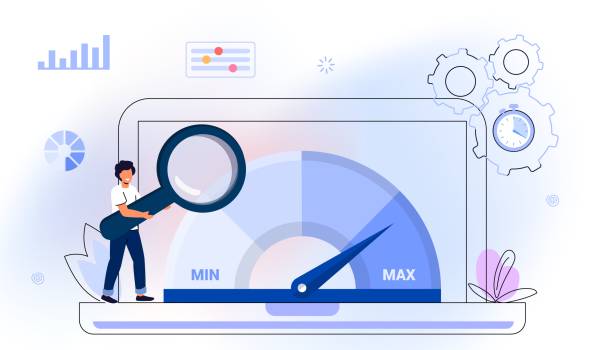Have you ever wondered how fast your internet connection really is? Whether you’re experiencing slow loading times, choppy video streams, or dropped connections, testing your internet speed can provide valuable information about the performance of your connection. In this guide, we will walk you through the simple steps to test your internet speed which will help you understand how well your connection is performing and identify any potential issues. With just a few clicks, you can gain valuable details that can help you troubleshoot problems, optimize your setup, and make sure that you’re getting the most out of your internet service. So let’s dive in without any delay and learn how to test your internet speed like a pro!
When to Test Your Internet Speed
Well, testing your internet speed is important at various times to ensure that you’re getting the best performance from your connection. Here are some situations when it’s a good idea to test your internet speed. Read them for a better understanding.
When You Notice Slow Performance: If you are experiencing slow loading times, buffering during streaming, or delays in web browsing, it is a good time to test your internet speed. This helps identify whether the issue is with your connection or something else.
Before Important Online Activities: Before engaging in activities that require a stable internet connection, such as video calls, online gaming, or large file downloads, it’s wise to test your internet speed. This will make sure that your connection can handle the demands of these activities without interruptions.
After Making Changes to Your Network: If you’ve recently upgraded your internet plan, changed your router or modem, or adjusted your network settings, testing your internet speed can help verify if these changes have improved your connection.
During Peak Usage Hours: Internet speeds can vary depending on the time of day, especially during peak usage hours when more people are online. Testing your internet speed during these times can give you an idea of how your connection performs under heavy traffic conditions.
When Troubleshooting Connectivity Issues: If you’re experiencing frequent disconnections, unstable connections, or other connectivity issues, testing your internet speed can be part of the troubleshooting process. It helps pinpoint potential causes of the problem.
By testing your internet speed regularly and in these specific situations, you can ensure that you’re getting the most out of your internet connection and address any issues promptly.
What Is a Good Internet Speed?
A good internet speed means having a connection that’s fast enough to meet your needs without causing frustration or slowdowns. Here’s a simple breakdown:
Basic Browsing and Email: For basic internet tasks like browsing websites and checking email, a speed of around 1-5 megabits per second (Mbps) is usually sufficient. This speed allows web pages to load quickly and emails to send and receive without delays.
Streaming Video: If you enjoy watching videos online, especially in high definition (HD), you’ll want a faster internet speed. A speed of at least 5 Mbps is recommended for streaming HD content smoothly without buffering or interruptions.
Online Gaming: Gamers often require faster internet speeds to ensure a smooth gaming experience with minimal lag. For online gaming, speeds of around 10-25 Mbps are ideal, depending on the game and platform.
Multiple Users or Devices: If multiple people in your household use the internet simultaneously or if you have many connected devices (like smartphones, tablets, smart TVs, etc.), you’ll need a higher internet speed to accommodate the increased demand. Speeds of 25 Mbps or higher are recommended for households with multiple users and devices.
Work or School: If you work or study from home and regularly participate in video conferences, upload/download large files, or use cloud-based applications, a reliable and fast internet connection is essential. Speeds of 25 Mbps or more ensure smooth and efficient online work or study sessions.
Ultimately, the right internet speed for you depends on your specific usage habits and the number of devices connected to your network. It’s essential to choose a plan that meets your needs to enjoy a seamless online experience.

Factors Affecting Internet Speed
Several factors can influence the speed of your internet connection. Understanding these factors can help you identify and address issues that may be impacting your internet speed. Here are some common factors to consider:
Hardware: The quality and condition of your hardware, such as your modem, router, and computer, can affect your internet speed. Older or outdated hardware may not support the latest internet technologies and may slow down your connection.
Network Congestion: During peak usage hours or in densely populated areas, network congestion can occur, leading to slower internet speeds. When many people are using the internet simultaneously, it can strain the network infrastructure and cause slowdowns for everyone.
Service Provider: Your internet service provider (ISP) plays a significant role in determining your internet speed. Factors such as the type of connection (DSL, cable, fiber-optic, etc.), the quality of the network infrastructure, and the service plan you’re subscribed to can all impact your internet speed.
Distance from the Server: The physical distance between your device and the server hosting the content or service you’re accessing can affect your internet speed. Generally, the farther away you are from the server, the longer it takes for data to travel back and forth, resulting in slower speeds.
Interference: Interference from nearby electronic devices, such as microwaves, cordless phones, and Bluetooth devices, can disrupt your Wi-Fi signal and degrade your internet speed. Try to minimize interference by positioning your router away from these devices and using channels with less interference.
Weather Conditions: Extreme weather conditions, such as heavy rain, snow, or strong winds, can potentially damage physical infrastructure (like cables or satellite dishes) and disrupt your internet connection, leading to slower speeds or outages.
Software and Settings: Software issues on your device, such as malware or outdated drivers, can also impact your internet speed. Additionally, incorrect settings or configurations on your modem, router, or device can cause performance issues and affect your internet speed.
| Call 866-861-4084 for Internet Deals |
How to Test Internet Speed
Testing your internet speed is easy and can help you understand how well your internet connection is performing. Here’s how you can do it:
Choose a Speed Test Website:
There are several websites that offer free speed tests. Some popular ones include Speedtest.net, Fast.com, and Google’s Internet Speed Test. You can use any of these websites to check your internet speed.
Start the Test:
Once you’ve chosen a speed test website, simply click on the “Begin Test” button to start the test. The website will then measure your internet speed by downloading and uploading data to and from your device.
Wait for the Results:
The speed test will take a few moments to complete. During this time, it will measure your download speed (how fast data is transferred from the internet to your device), your upload speed (how fast data is transferred from your device to the internet), and your ping or latency (how quickly data travels between your device and the server).
View Your Results:
Once the test is complete, the website will display your internet speed results in Mbps (megabits per second). You’ll typically see your download speed, upload speed, and ping displayed on the screen.
Interpret the Results:
Compare your internet speed results to the speeds advertised by your internet service provider (ISP). This will help you determine if you’re getting the speeds you’re paying for and if your connection is performing as expected.
Consider Factors:
Keep in mind that your internet speed can vary depending on factors such as network congestion, the type of connection you have (Wi-Fi or wired), and the time of day. It’s a good idea to run multiple speed tests at different times to get a more accurate picture of your internet speed.

Improving Internet Speed
If you’re experiencing slow internet speeds, there are several simple steps you can take to try and improve your connection. Here are some easy ways to boost your internet speed:
Restart Your Modem and Router: Sometimes, all it takes to improve your internet speed is a quick restart of your modem and router. Simply unplug them from the power source, wait a few seconds, and then plug them back in. This can help refresh your connection and resolve any temporary issues.
Check for Firmware Updates: Make sure your modem and router are running the latest firmware updates. Manufacturers often release updates to improve performance and fix bugs. Check the manufacturer’s website or the settings menu of your devices to see if any updates are available.
Move Closer to the Router: If you’re using Wi-Fi, try moving closer to the router to get a stronger signal. Walls, furniture, and other obstacles can weaken the Wi-Fi signal, leading to slower speeds. By reducing the distance between your device and the router, you can improve your connection quality.
Use Ethernet Instead of Wi-Fi: If possible, connect your device directly to the router using an Ethernet cable instead of relying on Wi-Fi. Ethernet connections typically provide faster and more stable speeds compared to Wi-Fi, especially over longer distances or in crowded areas.
Limit the Number of Connected Devices: Having too many devices connected to your network can slow down your internet speed, especially if they’re all using bandwidth-intensive activities like streaming or gaming. Try disconnecting devices that you’re not actively using to free up bandwidth for other devices.
Conclusion
Well, that’s a wrap. Testing your internet speed is a straightforward process that can provide valuable insights into the performance of your connection. By knowing your internet speed, you can troubleshoot issues, optimize your setup, and ensure that you’re getting the most out of your internet service. Whether you’re streaming videos, playing online games, or working from home, having a fast and reliable internet connection is essential for a smooth online experience. So take a moment to test your internet speed today and empower yourself with the knowledge to make the most of your internet connection.
FAQs
Why is my internet speed slower than expected?
Several factors, including network congestion, hardware issues, and service provider limitations, can contribute to slower-than-expected internet speeds.
How often should I test my internet speed?
It’s a good idea to test your internet speed regularly, especially if you notice performance issues or if you’ve made changes to your network setup.
What is a good internet speed for streaming video?
For streaming high-definition (HD) video content, a minimum internet speed of 5 Mbps is recommended. For 4K streaming, speeds of 25 Mbps or higher are preferable.
Can I improve my internet speed without upgrading my plan?
Yes, optimizing your network setup, troubleshooting hardware issues, and minimizing network congestion can help improve your internet speed without necessarily upgrading your plan.
Are there any free tools for testing internet speed?
Yes, there are numerous free online speed test tools available, including Speedtest.net, Fast.com, and Google’s Internet Speed Test.

Meet Jennifer Harper, a wordsmith extraordinaire who has been shaping the digital landscape with her creative prowess for the past two years. Not just a content writer; she is a storyteller who brings the content to life. Her passion for internet trends, memes, and the ever-evolving world of entertainment is evident in every piece she creates. Jennifer doesn’t just follow trends; she sets them.